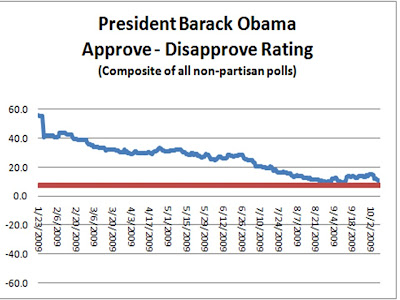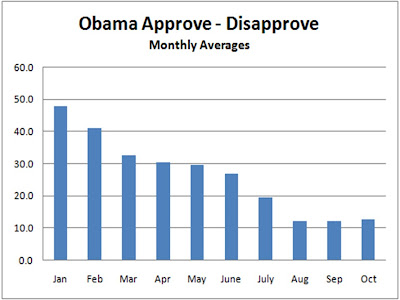Let's be honest here...President Obama has a pretty thin list of accomplishments to be deserving of a Nobel Peace Prize. He has been in office less than 9 months and frankly, was non-existent on the international stage prior to taking office. That isn't a knock necessarily, it's just a product of circumstance -- you aren't likely to have made major progress towards world peace in 9 months. Plus, as many on the left have pointed out -- we are still in Iraq, we are talking about elevation of troop levels in Afghanistan and Guantanimo Bay remains conspicuously open.
So this obviously isn't about Barack Obama's accomplishments as President of the United States. This ultimately, in my judgement comes down to two facts.
One, President Barack Obama is not President George W. Bush, a man so hated on the international scene that anyone who sounds halfway like a diplomat would be a massive upgrade in the eyes of the rest of the world. I traveled a fair amount to Europe during the Bush Presidency and the persistent questions I got while I was there was how a seemingly intelligent people could have elected such a man and how soon we were going to come to our senses and get rid of him.
Two, the story of a country that once kept black men as slaves rising to elect a black man as President is virtually unprecedented in world history. Can you name all the racial minorities running European countries? There are none. Sure, Nelson Mandela became President of South Africa, but that was a majority black country that was bound to elect a black President once black South Africans had full voting rights. The notion of a majority white country with a history of racism and opression rising up to elect a black man is an inspiring story to the world and one that at this point in world history, could only happen in America.
So whether you hate, love or feel somewhere inbetween about President Obama, let's acknowledge the olive branch that the world is trying to extend to us. The world wants to thank us and re-engage with us and that is a good thing. And, yes, let's admit as President Obama basically did, that he probably isn't very personally qualified for the award. It isn't like this is likely to diminish the significance of the Nobel Prize -- certainly President Obama is a more worthy winner of the award than Yasar Arafat was when he won.
Ebbs and Flows But No Real Trends
For the past two months, President Obama's approve minus disapprove has stayed in a pretty narrow range. For the most part, it has been somewhere in the range of +10% to +15%. He had 4 low days at the end of August where he dipped below +10% and a few other spotted days slightly below +10% or slightly above +15%, but for the most part, we've been stable within that range. As of today, President Obama is towards the low end of that range (+10.9% today). Whether this is the start of another trend of poll deteriorization or just an ebb within a longer-term stable trend remains to be seen.

The monthly numbers (that level out some of the daily polling noise) show a similar story. President Obama was +12.3% in August, +12.3% in September and +13.0% month to date in October. Since his daily numbers are below his month-to-date numbers, his October numbers seem likely to drop slightly further -- if today's numbers held for the rest of the month, President Obama would finish the month at around +11.5%.

A Review of the Recession's Job Carnage and the Economic Stimulus
7.2 million. That is the total number of jobs that have been lost in this country since the job numbers started heading south in January of 2008. This number is actually worse than it sounds, if you can believe that. Since the size of the population and the workforce continues to grow, we need to create somewhere around 150,000 jobs every month just to keep the employment rate stable. If you factor this growth in with the 7.2 million jobs that have been lost and we have something like a 10.4 million job hole -- that is, we would have to create 10.4 million new jobs to bring employment back to where it was in late 2007.
The chart below shows the trend of job gains and losses since January 2007 along with major events in the recession.

As you can see from the chrt, the recession started slowly in early 2008 with job losses that were noticeable, but mild enough to not really capture the national attention. Then Lehman Brothers failed, the financial industry locked up and things got very bad, very quickly, with job losses peaking in January of 2009 at an astonishing 741,000 jobs destroyed. Job losses stayed very bad, but started to decline slightly early in the year, then declined significantly shortly after the stimulus bill was signed. We are still negative through last month, which means that unemployment is still getting worse, but it is getting worse less fast.
So what does this tell us about the stimulus? It depends on your interpretation. There is clearly a correlation between the stimulus going into law and job losses declining. But correlation doesn't necessarily mean that one caused the others. Conservatives would argue that this is just a natural recovery in the business cycle and that the stimulus did not contribute to it. No one can know for sure, but I, for one, firmly believe that injecting more money into the economy has been helpful.
As of this week, $110.7 billion has been paid out of the stimulus spending funds (22.2% of the total) and $256.3 billion has been authorized (51.4% of the total), plus the tax cuts as part of the bill, which have been in place since May.
Clearly the evidence indicates that some aspects of the bill -- Cash for Clunkers, the First Time Home Buyer Credit are having an impact in recovering the languishing auto and home industries. Other aspects are less clear, but obviously road construction projects require road crews, school construction requires construction workers, etc., so it seems obvious that the short-term impact on employment is a net positive.
So when will we swing to net positive job creation? It's hard to say for sure, but an X^3 polynomial that is the best fit (and the highest order that passes statistical tests for significance) to the employment trend would project that we will reach positive job growth in approximately December and cross the 150,000 rate that would begin to drop the unemployment rate around February. Obviously a mathematical model doesn't project all the things that could change in our economy. And even if it is right, that's still a lot of pain before we get back to normal.
My final conclusion: the stimulus appears to be working, but not nearly fast enough. The spend was not structured to be impactful enough quickly enough. Let's get moving on getting people back to work.
If you like this site, tell your friends



No comments:
Post a Comment